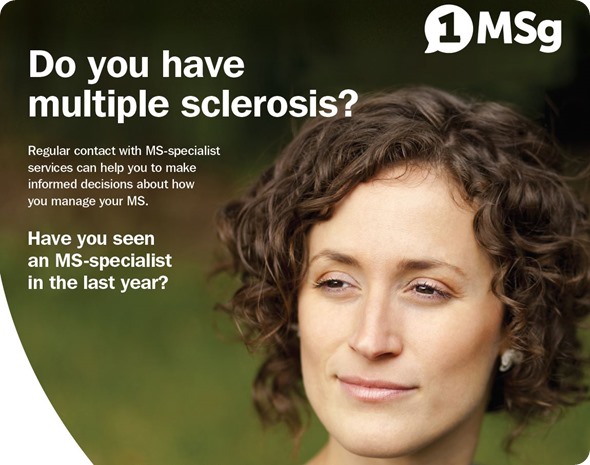The recent survey you ask about was conducted by the MS Trust in 2012. It revealed that nearly one fifth of respondents had seen neither an MS specialist nurse (MSSN) nor a neurologist in the past year, and so will not have received the comprehensive annual review recommended by the National Institute for Health and Care Excellence (NICE).
This indeed was very concerning as the MS Landscape has and continues to evolve and there are many people with MS who could benefit from looking at how they are managing their disease. It is possible that they are missing out on more appropriate medications, advice about empirically based interventions.

It might be that there are medications and treatments available they are now eligible to receive. Also MS professionals have up to date knowledge of new research and new ways of working which without regular contact patients will no gain benefit from this.
Another concern I have is that all too often patients end up with an impoverished quality of life including broken relationships, unemployment and social isolation which if there had been regular interaction with their MS professional might have been preventable.
What are the main reasons people with MS are missing out on MS services?
I believe that often it is a lack of patient understanding about the clinical implications of not taking proactive action that could be considered a significant factor in discouraging some people with MS from accessing services and support.
Many people with MS have “invisible symptoms” such as fatigue, bladder issues or mild changes in cognition and as they “manage” to live with these issues compared to loss of mobility they can believe the potential severity of the condition can be underestimated.
We know that just because there appears to be little outward change does not mean that significant change may not be occurring pathologically.
In addition, a lack of awareness about the clinical benefits of early intervention, and a lack of patient understanding about the range of treatment options available are considered key factors in dissuading some people from regular engagement with a specialist.
But both the responses above “blame the patient” – we also have to be aware that health services are stretched and often if a patient misses an appointment, maybe as a result of cognitive change caused my MS (in other words they forget) they will then either be “taken off the list” meaning they have to be re-referred and this can be an onerous process for someone dealing with MS. They can get lost to follow-up very easily because of appointment processes.
Also there still remains an inequality of services across the UK so they are missing out often because there is either no or such little service patients may just not get regular follow ups.
What should MS-specialists do to help improve engagement with MS patients?
I think that empowering patients to be actively involved in their treatment is imperative. Campaigns such as 1MSG not only encourages patients to engage but I believe it will encourage MS Professionals to think about engagement.
I think looking at how we engage patients and get information to them will be important. Having systems in place to ensure regular appointments, looking at how and where clinics are held for example if a person with MS lives in a rural area and unable to get to large city hospitals could a “village surgery” be run to capture patients in a locality – many GPs are now doing this. Maybe Skype appointments for those who are bed-bound or unable to access clinic, or drop in clinics.
Regular meetings with patients – 6 or 12 monthly where they are provided with information about symptom management. Use of social media to get accurate messages out, involving local MS groups – this list is endless but I do believe now is the time across healthcare to start “thinking outside of the box”.
What are the main benefits of regular and quality engagement with MS-specialists?
The top benefits are access to ongoing education to help people understand the disease, advice on the management of MS symptoms, regular monitoring of disease progression, including identifying relapses and regular reviews and advice regarding treatment options, and advice on relapse management, all of which are vitally important.
How has the MS landscape evolved over recent years?
Our understanding of the disease has significantly improved and with that means new treatments have been developed. There have been huge advances in medications, which means we are seeing people having a better quality of life with less burden of disease.
There are new non-pharmacological interventions available which can have significant impact on empowering a person to self-manage symptoms such as fatigue, depression and cognitive difficulties.
MS is now protected in the same way as cancer under employment law which means we can support people to remain in employment longer and healthier. And even as I type this evolution is happening.
What impact have technological developments such as magnetic resonance imaging (MRI) had on the ability to monitor signs of MS progression?
A huge impact. We can detect MS far sooner and more accurately. We can detect change quicker and more accurately which in turn means we can consider treatment options with more clarity.
But also such developments are really helping in researching the disease processes which helps us understand more fully the disease and aid the development of new treatments. But this is only a small part of the overall process of working and caring for patients with MS.
How important is early intervention in the long-term management of MS?
We believe this is extremely important.
There is empirical evidence that starting treatment as soon as possible after an MS diagnosis can delay disease progression, enabling people with MS to live independently longer. So the quicker we can start to treat the disease the greater the long-term benefits.
To further highlight how disease progression can be delayed is to look at the studies considering Clinically Isolated Syndrome (CIS). Several studies have found that beginning treatment after a CIS but before a definite diagnosis of MS can significantly reduce the likelihood that someone will be diagnosed with MS in the next two years or longer, even though it can't prevent MS altogether. However providing treatment for this population is not standard.
What guidance would you give to someone with MS who has lost touch with their specialist support?
To get in touch, pick up the phone and request and appointment with the MS nurse and they can then ensure you get all the right support they need. They will be happy to hear from you!
Can you please give a brief overview of the aims of MS Awareness Week? What impact do you hope this will have?
We want to shape a fair future, where everyone affected by MS can access the specialist care that works for them.
MS Awareness week is about highlighting the challenges faced by people with MS. It is important to highlight the new consensus for treatment for people with relapsing remitting MS. This recommends that people with relapsing remitting MS receive treatment with a disease modifying drug (DMD) as close as possible to diagnosis. It also recommends that treatment should be closely monitored, and, if there are still signs of disease activity, a switch to a different, more effective treatment should be considered.

To highlight the importance of appropriate NHS provision and ensure appropriate services are developed so that regardless of whether a person with MS is newly diagnosed or has progressive MS, whether they live in a remote area or in a big city, whether they are a child or an adult they have access to all appropriate services.
I hope this campaign will highlight dispel myths associated with MS especially with how it is often portrayed in Media, that will highlight the importance to those living with MS to engage with services, and to Healthcare providers from Government through to clinicians the importance ensuring services are available. I hope there will be a great impact but we all need to work together – the bigger the noise the greater the result.
What do you think the future holds for MS specialist services and patient engagement?
I am hopeful that with campaigns such as IMSG and MS Awareness Week and work conducted by the national charities – MS Society and MS Trust that engagement will increase and we will see people with MS having a better quality of life, being able to be more independent and being empowered to have a voice about their MS – to be listened to.
Where can readers find more information?
About Dr Anita Rose
Dr Anita Rose is a Consultant Neuropsychologist. She is currently the Consultant Neuropsychologist at the Raphael Medical Centre in Tonbridge and also works as an independent Consultant Neuropsychologist across the globe. She has had a passionate interest in Neuropsychology obtaining extensive experience in this field since 1998.
Dr Anita Rose is known as a Champion for Multiple Sclerosis and provides significant input into the field of multiple sclerosis via her clinical work, research, publications, booklets and consultancy to the MS Groups in the UK, as Vice Chair for the European Neuropsychology Special Interest Group in MS, and is the Vice Chair and Clinical Advisor to the MS Society in South Africa. She is currently embarking on a number of projects. One project is conducting research together with colleagues across Europe looking at the issue of sexuality in MS. She is also currently working on book to support clinicians working with MS patients and compiling a book of stories of people living with MS to raise awareness of this condition.
Dr Rose is well known in the field of Brain Injury. She conducts significant research into Brain Injury and Chronic Neurological Conditions and has published research and many self-help booklets she also provides consultancy in this area. She has recently co-authored a book looking at late recovery from the vegetative state and working on a number of research projects including a revision of the Wessex Head Injury Matrix (WHIM).
Dr Anita Rose is a sought after speaker across the globe with her message being one of empowerment to both people who have neurological conditions and to health professionals who work in the field of neurology.